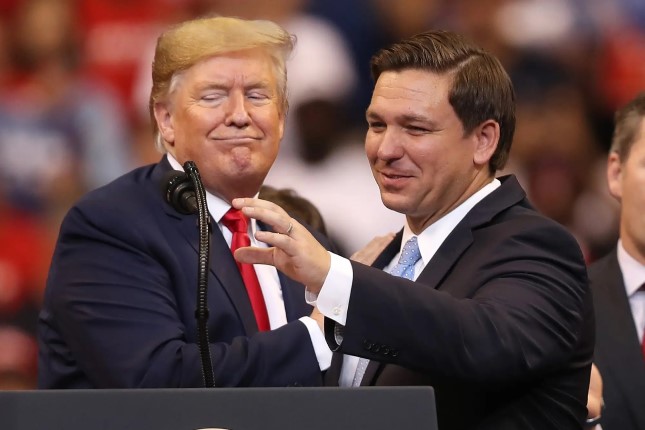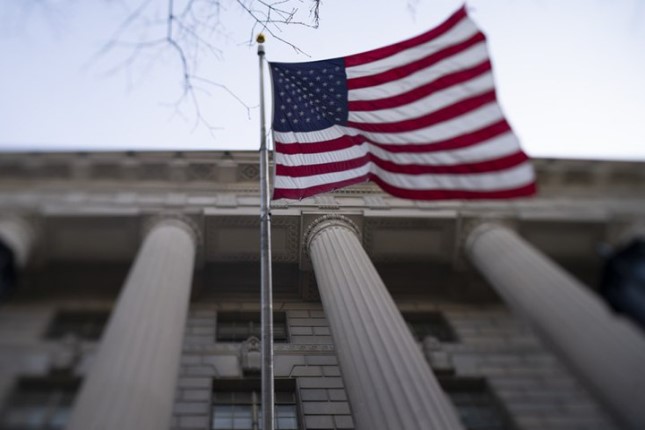Following his comfortable win to get re-elected as governor of Florida, Ron DeSantis has assured himself the title of the Republican Party's "last great hope", or, to be more precise, the last hope of the Republican establishment.
There is no disputing that DeSantis is currently one of America's most popular and strongest conservative political figures. And yet, the prominence that has been ascribed to his persona may well be overstated, as it reflects the Republican establishment's desire not to change anything of substance in the party while providing a counterbalance to the unpredictable Trump.
According to the November 22 survey from Emerson College Polling, if DeSantis were the 2024 nominee, he would lose to Biden by four percentage points, the same lead that Biden currently holds over Trump. The survey found that if the 2024 elections were held today, Biden would defeat Trump by a margin of 45% to 41%, whereas his lead over DeSantis would be 49% of the votes against the latter's 39%. In other words, the way things go today, the Democratic incumbent would enjoy a comfortable win over either of his two key Republican rivals.
However, in a hypothetical 2024 Republican presidential primary, DeSantis would lose to Trump by a huge margin of 25% vs Trump's 55% of the votes.
So why is it that Republican-leaning commentators insist on referring to DeSantis as the GOP's "last big hope"? Because DeSantis is the only one capable of gently pushing Trump to the sidelines without precipitating a potentially disastrous rift among both existing and potential supporters of the Republican Party.
Tea Party Movement's Sword of Damocles
Ever since the end of the George W. Bush term in office, the Republican Party has been continually teetering on the brink of a schism. Throughout the Bush presidency, an average Republican voter was feeling betrayed and forsaken. The White House got too carried away with its overseas military exploits, dramatically increased the country's national debt, ultimately forfeiting the United States to Barack Obama, whose manner of running the government was hardly compatible with the aspirations of a run-of-the-mill Republican voter.
Conservative voters responded to this by establishing their own powerful protest movement that became known as the Tea Party Movement. The founding of the movement was specifically precipitated by the GOP's inability to challenge the Obama administration's 2009 crisis management policies and what they viewed as the "socialist" healthcare system reform.
By 2010, things had come to a dramatic pass. In her keynote speech to the first National Tea Party Convention in Nashville, Sarah Palin, a 2008 vice-presidential candidate and an ex-governor of Alaska, called for another American revolution with the objective of retaking the Congress as the result of midterm elections under populist slogans. In the end, the triumphant Republicans regained their House majority by winning the largest number of Congress seats since 1946.

Sarah Palin.
However, this resurgence and triumph of radical conservatives did not just scare the Democrats. Above all, it put fear in members of the Republican establishment who felt that their control of the party was slipping from their hands. So, they pulled out all the stops to defeat and destroy the Tea Party Movement. These efforts ultimately paid off: by 2016, there was not a trace of the Tea Party followers left on America's political scene. And then suddenly, Trump sprang out of nowhere.
Common sense isn't really enough
In fact, the election of Trump as the Republican presidential nominee played a major role in the Tea Party's decline. When Trump came along, Tea Party voters saw him as their own legitimate candidate in the GOP. At that time, the party's leadership was demoralized by anti-establishment dissatisfaction at the grassroots level and by the lack of strong Republican leaders capable of challenging the Democrats.
Moreover, few believed in Trump's election victory given his unconventional candidacy. As it turned out, it was Trump's non-systemic status, along with his reliance on social media, that ensured his success. Looking back in retrospect, there's no denying that Trump helped the Republican Party to attract a lot of new supporters.
Even though Trump essentially brought the GOP back to life, by and large, he was never accepted by the party as one of their own. He was too impulsive and unpredictable. Throughout his term in office, Trump wreaked havoc on the deep bipartisan state, dredging up shady deals whenever he could expose them. In the end, this strategy cost him reelection in 2020.
What about the Republican Party now?
Trump seems to be serious about running for president in 2024. If he does run again, it will be extremely difficult to stop him in the Republican primaries. More importantly, his bid threatens to split the party. Trump could also run as an independent candidate, which is likely to cause a deep rift among grassroots activists and voters that the Republican Party might not survive, especially considering the long-lasting crisis within the party and the prevailing cultural and demographic trends in the United States.
As a result, the GOP's establishment can't simply push Trump out. The party needs to find a viable successor if Republican leaders really want Trump to step aside. In these circumstances, Ron DeSantis looks well placed to succeed Trump.

It appears that a large-scale campaign is currently underway behind the scenes to convince Republican activists and leaders who share Trump's presidential ambitions that they would be better off with DeSantis.
DeSantis is indeed very good as a common-sense politician. He was very effective when he handled covid-related hysteria and dealt with media corporations (such as Walt Disney Co) that tried to impose transgender instruction on school children in Florida. The problem is that it takes more than just common sense to win US presidential elections today.
This is not to suggest, however, that DeSantis will not become the Republican Party's presidential nominee. He may have a smaller chance of winning, but things would be much quieter if he is around. And that could be a strong argument for those Republican activists that are still siding with Trump.
Recent polls suggest that DeSantis has a lower disapproval rating than the flamboyant but eccentric former president. At some point, this might tip the scales in DeSantis's favour, but this scenario is probable only if Trump himself decides not to fight to the end.
































